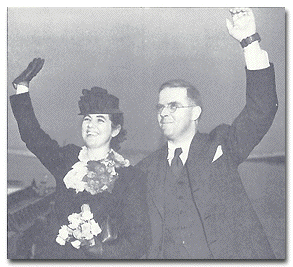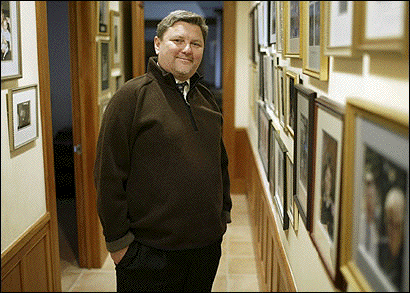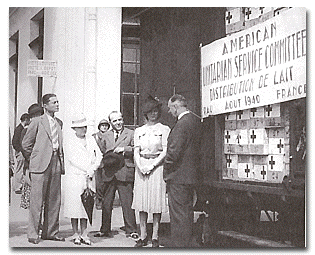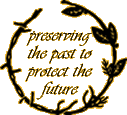Deeds Earn Place
Among the Righteous
Wellesley, Massachusetts, USA
couple,
Martha and Rev. Waitstill Sharp,
helped hundreds flee Nazi regime during
Holocaust
By Joseph P. Kahn
Globe Staff
December 12, 2005

Martha
and Rev. Waitstill Sharp departed for Europe
from New York City in February 1939
In
February 1939, a young Wellesley, Massachusetts, USA,
couple embarked on a mission that would alter their lives
and thousands of others. The Rev. Waitstill Sharp, 37, a
Unitarian minister, and his wife, Martha, 33, set aside
personal concerns for a vastly more urgent cause. Leaving
their two young children behind, they arrived in
Czechoslovakia a month before the German occupation and
began assisting Prague's growing refugee
population.
Over the next two years, the
Sharps helped secure food, shelter, visas, and freedom
for hundreds of Jews and non-Jews targeted by the Nazi
regime. Now deceased, the couple seldom spoke publicly
about their work abroad. But last month, from an Israeli
tribunal to a local elementary school, their rescue
efforts spoke loudly for them. And an international honor
previously bestowed upon only one American was added to
their legacy.
Two people who campaigned
vigorously for that honor on the Sharps' behalf are
Rosemarie Feigl, 80, an Austrian Jew who immigrated to
America in 1940, and Artemis Joukowsky III, a Sherborn
businessman and grandson of the Sharps. Together they
recently visited the Eliot Montessori School in Natick to
talk about the Holocaust. One 12-year old asked whether
any children had died in the concentration camps. Yes,
said Feigl, many did. How did you feel, the girl wanted
to know. Scared, Feigl answered.
''I'm not one to forget the
past," Feigl remarked during an interview the next day at
Joukowsky's house. ''My grandparents died in Auschwitz.
Martha Sharp saved my life and my parents."
Joukowsky, sitting nearby, said
that because Feigl is alive to bear witness, another
rescue has occurred: that of his grandparents' rightful
place in the roll of the righteous.
''They never got the proper
credit," Joukowsky said with a smile. ''Now they
have."
|

|
|
|
Artemis
Joukowsky III campaigned vigorously to have his
grandparents, Waitstill and Martha Sharp,
recognized for their efforts to save hundreds of
people from Nazis. Joukowsky was joined in his
quest by Rosemarie Feigl, whom Martha Sharp
helped save. (Jonathan Wiggs/ Globe
Staff)
|
Behind the smile, and the visit by Feigl, was this
fall's announcement that the Sharps had been chosen
Righteous Among the Nations by Yad Vashem, the Holocaust
remembrance authority in Jerusalem. Established in 1953,
Yad Vashem has selected more than 21,000 non-Jews for the
honor, including 499 this year. Among past honorees is
Oskar Schindler, whose story inspired ''Schindler's
List," the Academy Award-winning film.
The selection criteria are
demandingly specific, including testimony from at least
one living witness. Until this year, the only American
selected was Varian Fry, who worked closely with the
Sharps and is often referred to as ''the American
Schindler."
When news of the Sharps'
selection was announced last month to the Wellesley
congregation they once led, its significance began to
sink in, especially among members of the local Unitarian
community. A special celebration will take place tonight
at the Unitarian Universalist Society in Wellesley Hills,
with Feigl in attendance. In June, a formal induction
ceremony will be held in Israel.
''So many stories about the
Holocaust are negative," Joukowsky said when asked about
his grandparents' legacy. ''This is a story about
ordinary people who did remarkable work by taking risks.
And that's an example for all of us today."
A dangerous
trip
What the Sharps took on 65 years
ago, and how Yad Vashem came to validate their acts, is
part history lesson and part detective saga -- a tale of
two individuals whose heroics might have been lost to
posterity without the efforts of relatives who possessed
the resources and motivation to set the record
straight.
Martha Dickie Sharp, a
Providence native, and Waitstill Sharp, whom she married
in 1928, were highly educated people with a deep faith in
religious liberalism when they left for Europe. Waitstill
had a law degree from Harvard, Martha a master's degree
from Radcliffe. They had settled into their Wellesley
pastorate in 1936, when their son, Hastings, was 3 and
their daughter, Martha, a newborn.
|

|
|
|
In
August 1940, Martha Sharp (second from right)
visited a milk shipment center that she
established in Pau, France. The center
distributed 14 tons of milk products to starving
children.
|
The Sharps' first trip abroad ended in August 1939, with
the Gestapo closing in on them and Martha facing imminent
arrest. Less than a year later, they headed for Lisbon
under the auspices of the newly formed Unitarian Service
Committee. As much of southern France soon fell under
Vichy control, the Sharps focused on two especially
vulnerable constituencies: prominent intellectuals and
refugee children.
''Waitstill and Martha learned
the legal and illegal escape routes out of occupied
France," recalled Artemis Joukowsky, who is working on a
film and book about his grandparents, in a speech last
month to Wellesley's Unitarian congregation. ''They
traded money on the black market in order to bribe border
guards and pay for rail, air, or sea transportation for
the refugees. On occasion, they personally escorted
high-profile refugees out of France."
The refugees included Nobel
laureate physicist Otto Meyerhof and writers Heinrich
Mann (brother of Thomas), Franz Werfel (''The Song of
Bernadette"), and Lion Feuchtwanger (''Proud Destiny").
Feuchtwanger's rescue from Marseilles was particularly
dangerous, and therefore of special interest to Yad
Vashem, because his name had been posted on the Nazi's
''most wanted" list. With the aid of Red Cross officials,
the Sharps joined Varian Fry, head of the Emergency
Rescue Committee, in smuggling Feuchtwanger out of Europe
and to the United States, where he landed in September
1940.
Calling the risks taken by the
Sharps ''superhuman," Dr. Mordecai Paldiel, director of
Yad Vashem's Righteous Among the Nations Department,
wrote in an e-mail last week that the commission was
particularly impressed by Martha Sharp's
heroism.
''Sharp, who dressed up as a
French farming woman, accompanied Lion Feuchtwanger on a
risky train ride from Marseilles to the Franco-Spanish
border," Paldiel wrote. ''Then distracted . . . Spanish
border guards" so Feuchtwanger's false identity would not
be discovered. At the same time, Paldiel noted, Waitstill
''was also involved in illegal acts" and risking
imprisonment, if not worse, at the hands of the
Nazis.
Lives apart
As the refugee situation
worsened, the Sharps concentrated on rescuing as many as
they could, often working apart while maintaining close
contact from their separate theaters of operation. Martha
toured refugee camps and established a vital
milk-distribution network in southern France. While
seeking visas for refugee children and their families in
the summer of 1940, she met Eva Rosemarie Feigl, the
teenage daughter of a Vienna lawyer. That December, Feigl
joined a group of 27 children -- nine of them Jewish --
who escaped to America.
''She didn't do it for money or
to become famous," Feigl wrote in a testimonial letter to
Yad Vashem last winter. ''And she didn't do it for any
specific religious reason" other than ''to be a good
human being."
The Sharps returned stateside in
1940 and resumed life in Wellesley, but their personal
story lacked a fairy-tale ending. For the next few years,
the Sharps traveled abroad on international relief
missions, raising money and awareness for the Unitarian
Service Committee and other organizations. But as time
passed, according to Joukowsky, the couple began pursuing
different agendas -- and eventually separate lives
altogether.
In 1948, Martha Sharp ran for
Congress against Republican Joseph Martin Jr., the future
speaker of the House. Having captured the Democratic
nomination on a pro-labor, internationalist platform --
the Sharps were known as ''Guardian Angels of European
Children" -- she was first portrayed as a cookie-baking
housewife, then smeared as a suspected
Communist.
Among the voluminous FBI files
on Martha that Joukowsky recently obtained is a J. Edgar
Hoover memo promising to look into the story ''going
around up there," as Hoover put it, that Sharp had ties
to the Communist Party.
The rumors never panned out, and
Sharp herself lashed back at the ''Gestapo tactics,"
complaining that her phone had been tapped and her
campaign headquarters burglarized. The damage had been
done, though, and she lost the election by more than
30,000 votes.
''My mother was deeply hurt. It
was a cruel smear job. But she never wanted to talk about
it," said her daughter, Martha Sharp Joukowsky, a Brown
University archeologist. What toll the war and its
aftermath took on her parents' marriage is unclear, she
added, because they ''did not talk about personal
things." But by 1950 they were headed for a stormy
divorce.
Martha moved to Washington,
D.C., to work for the Truman administration. In 1957, she
married David Cogan, a wealthy Jewish businessman, and
devoted herself to charitable and humanitarian causes
here and abroad, serving on the boards of Hadassah, the
Girls Clubs of America, and other nonprofit
organizations. She died in Providence in 1999, at age
94.
Waitstill Sharp, also remarried,
returned to the ministry, and settled first in Chicago,
then Flint, Mich., for 20 years. His involvement in civil
rights and antiwar activities precluded much talk about
rescuing wartime refugees, Martha Joukowsky said. Later,
he retired to Greenfield, where he died in
1984.
''What they did, they did
hand-in-hand," Joukowsky said. ''So it's appropriate they
be brought back together by this honor."
Detective
work
Joukowsky's two sons, Artemis
and Michael, pushed hard for Yad Vashem to hear their
grandparents' case. A private detective was hired to
track down any surviving children whom their grandmother
had rescued. The family also underwrote a documentary
film about the Sharps that is being assembled by Keene
State College faculty members, Lawrence Benaquist and
William Sullivan.
A year ago, Feigl was located
and happily agreed to testify on Martha's behalf. More
help was provided by Stanlee Stahl, executive vice
president of The Jewish Foundation for the Righteous, an
organization that provides financial support for non-Jews
who rescued Jews during the Holocaust. Stahl introduced
Joukowsky to Paldiel last winter, and over the next 10
months Paldiel's committee met twice to debate the
Sharps' case.
''My grandmother's case was a
slam-dunk, because we had Rosemarie," Artemis Joukowsky
noted. ''But Waitstill's was harder. The issue for the
Israelis was, did my grandparents face physical danger?
Were there Gestapo around -- or merely Vichy officials?
There was no question my grandfather had risked his life,
but it contradicted the history Fry had
written."
A key break was the discovery of
a document typed by Fry and stored in the archives of
Columbia University. It corroborated Waitstill's role in
rescuing Feuchtwanger and was, as Joukowsky put it, an
''Oh, my God" moment.
''We weren't out to destroy
Fry's credibility, because he worked very hard,"
Joukowsky said. ''And we didn't want to be on the bad
side of history. But once they saw that
[document], it was clear Waitstill would be
chosen."
The votes were taken in
September, yet news of the Sharps' honor has been slow to
spread until last week, when the Unitarian Universalist
Service Committee issued a press release about the award.
When she got the call from Israel last month, Stahl said,
''I was happy for the family, of course, but for
students, too. They need to know that Americans not only
fought to make the world safe, but that ordinary people
like the Sharps did extraordinary things."
Is Fry's legacy diminished by
the Sharps' story? On the contrary, according to Paldiel.
What the Sharps did ''adds greater significance" to it by
fleshing out details of Feuchtwanger's rescue, he said.
Nevertheless, he acknowledges, Yad Vashem is ''fighting
against time" as the survivor population ages and
credible testimony becomes harder to obtain.
Still, he writes, ''We have a
moral obligation to certify and acknowledge all stories
of rescue during the Holocaust, as a legacy and lesson to
future generations that man has the potential to act in
the most elevated humanitarian form possible."
Sixteen descendants of Waitstill
and Martha Sharp will travel to Israel next summer for
the induction ceremony.
© Copyright
2005 The New York Times Company
